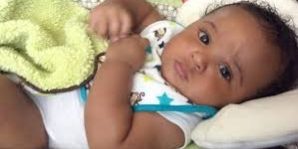| Age |
About |
Act early by talking to your child’s doctor if your child: |
At 2 months
 |
Social/Emotional
- Begins to smile at people
- Can briefly calm himself (may bring hands to mouth and suck on hand)
- Tries to look at parent
Language/Communications
- Coos, makes gurgling sounds
- Turns head toward sounds
Movement/Physical/Cognitive Development
- Can hold head up and begins to push up when lying on tummy
- Begins to follow things with eyes and recognize people at a distance
|
- Doesn’t respond to loud sounds
- Doesn’t watch things as they move
- Doesn’t smile at people
- Doesn’t bring hands to mouth
- Can’t hold head up when pushing up when on tummy.
|
At 4 months
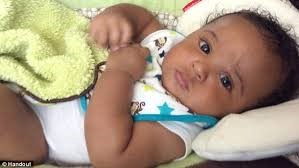 |
Social/Emotional
- Smiles spontaneously, especially at people
- Likes to play with people and might cry when playing stop
- Copies some movements and facial expressions, like smiling or frowning
Language/Communications
- Begins to babble
- Cries in different ways to show hunger, pain and being tired
Movement/Physical/Cognitive Development
- Holds head steady, unsupported
- Pushes down on legs when feet are on a hard surface
- May be able to roll over from tummy to back
- Can hold a toy and shake it and swing at dangling toys
- Brings hands to mouth
- When lying on stomach, pushes up to elbows
- Reaches for toy with one hand
- Follows moving things with eyes from side to side
- Recognizes familiar people and things at a distance
|
- Doesn’t watch things as they move
- Doesn’t smile at people
- Doesn’t bring hands to mouth
- Doesn’t coos or make sounds
- Doesn’t push down with legs when feet are placed on a hard surface.
|
At 6 months
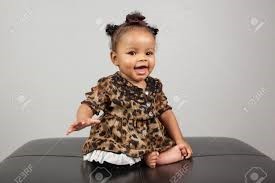 |
Social/Emotional
- Knows familiar faces
- Likes to play with others especially parents
- Likes to look at self in a mirror
Language/Communications
- Strings vowels together when babbling (‘ah’, ‘eh’, ‘oh’)
- Responds to own name
- Makes sounds to show joy and displeasure
Movement/Physical/Cognitive Development
- Rolls over in both directions
- Begins to sit without support
- When standing, supports weight ion legs and might bounce
- Rocks back and forth
- Brings things to mouth
- Begins to pass things from one hand to the other
|
- Doesn’t try to get things that are in reach
- Shows no affection for caregivers
- Doesn’t respond to sounds around him/her
- Has difficulty getting things to mouth
- Doesn’t make vowel sounds (“ah”, “eh”, “oh”)
- Doesn’t roll over in either direction
- Doesn’t laugh or make squealing sounds
- Seems very stiff, with tight muscles
- Seems very floppy, like a rag doll
|
At 9 months
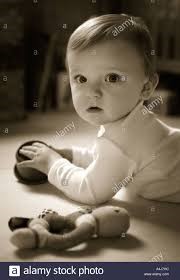 |
Social/Emotional
- Has favourite toys
- May be afraid of stranger
- May be clingy to familiar adults
Language/Communications
- Understands ‘ no’
- Makes a lot of different sounds like ‘mama’, ‘baba’.
- Copies sounds and gestures of others
- Uses fingers to point at things
Movement/Physical/Cognitive Development
- Looks for things he/she sees you hide
- Plays peek-a-boo
- Puts things in her mouth
- Picks up things using thumb and index finger
- Stands holding on
- Can get into sitting position
- Sits without support
- Crawls
- Pulls to stand
|
- Doesn’t bear weight on legs with support
- Doesn’t sit with help
- Doesn’t babble (“mama”, “baba”, “dada”)
- Doesn’t respond to own name
- Doesn’t seem to recognize familiar people
- Doesn’t look where you point
- Doesn’t transfer toys from one hand to the other
|
At 12 months
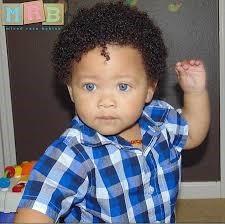 |
Social/Emotional
- Cries when mom or dad leaves
- Has favourite things and people
- Shows fear in some situations
- Repeats sounds or actions to get attention
- Puts out arm or leg to help with dressing
Language/Communications
- Responds to simple spoken requests
- Waves bye bye
- Tries to say words you say
Movement/Physical/Cognitive Development
- Explores things in different ways, like shaking, banging and throwing
- Finds hidden things easily
- Copies gestures
- Starts to use things correctly like drinking from a cup, brushes hair
- Bangs two things together
- Puts things in a container, takes things out of a container
- Pokes with index finger
- Follows simple instructions like ‘pick up the toy’
|
- Doesn’t crawl
- Can’t stand when supported
- Doesn’t search for things that she sees you hide.
- Doesn’t say single words like “mama” or “dada”
- Doesn’t learn gestures like waving or shaking head
- Doesn’t point to things
- Loses skills he once had
|
At 18 months
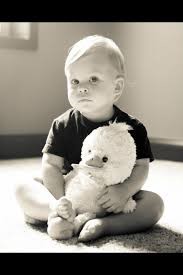 |
Social/Emotional
- Likes to hand things to others as play
- May have temper tantrums
- May be afraid of strangers
- Shows affection to familiar people
- May cling to caregivers in new situations
- Points to show others something interesting
- Explores alone but with parents close by
Language/Communications
- Says several single words
- Says and shakes head ‘no’
- Points to show someone what he wants
Movement/Physical/Cognitive Development
- Points to get the attention of others
- Shows interest in a doll or stuffed animal by pretending to feed
- Points to one body part
- Scribbles on his own
- Can follow 1-step verbal command without gestures, for example, sits when you say ‘sit down’
- Walks alone
- May walk upstairs and run
- Pulls toys while walking
|
- Doesn’t point to show things to others
- Can’t walk
- Doesn’t know what familiar things are for
- Doesn’t copy others
- Doesn’t gain new words
- Doesn’t have at least 6 words
- Doesn’t notice or mind when a caregiver leaves or returns
- Loses skills he once had
|
At 2 years
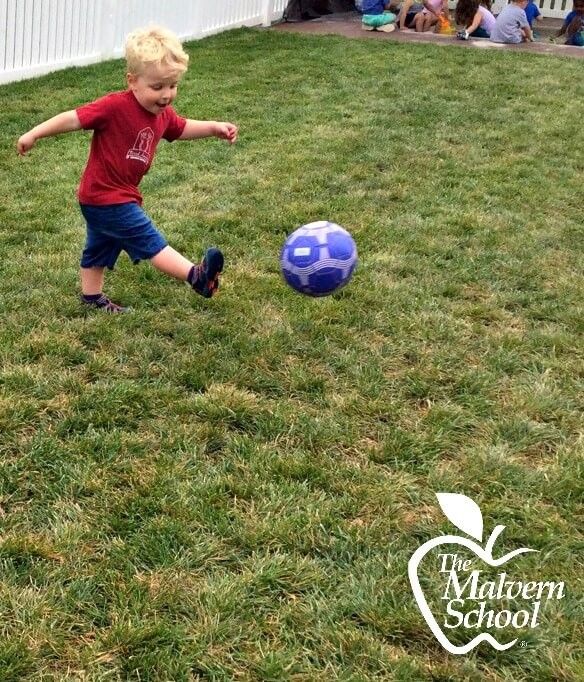 |
Social/Emotional
- Copies others, especially adults and older children
- Gets excited when with other children
- Shows more and more independence
- Shows defiant behaviour (doing what he has been told not to do)
Language/Communications
- Points to things or pictures when they are named
- Knows names of familiar people and body parts
- Says sentences with 2 to 4 words
- Follows simple instructions
- Points to things in books
Movement/Physical/Cognitive Development
-
- Finds things even when hidden under 2 or 3 covers
- Begins to sort shapes and colours
- Completes sentences and rhymes in familiar books
- Builds towers of 4 or more blocks
- Might use one hand more than the other
- Follows two step instructions like ‘pick up your shoes and put them in the basket’
- Names items in a picture book like cat, bird, or dog
- Stands on tiptoe
|
- Doesn’t use 2-word phrases (for example, “drink milk”)
- Doesn’t know what to do with common things, like a brush, phone, fork, spoon
- Doesn’t copy actions and words
- Doesn’t follow simple instructions
- Doesn’t walk steadily
- Loses skills she once had
|
At 3 years
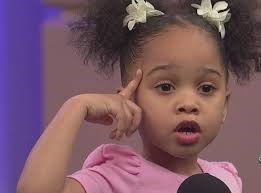 |
Social/Emotional
- Copies adults and friends
- Shows affection for friends without prompting
- Takes turns in games
- Shows concern for a crying friend
- Understands the idea of “mine” and “his” or “hers”
- Separates easily from mom and dad
- May get upset with major changes in routine
- Dresses and undresses self
Language/Communications
- Follows instructions with 2 or 3 steps
- Can name most familiar things
- Understands words like “in,” “on,” and “under”
- Says first name, age, and sex
- Names a friend
- Says words like “I,” “me,” “we,” and “you” and some plurals (cars, dogs, cats)
- Talks well enough for strangers to understand most of the time
- Carries on a conversation using 2 to 3 sentences
Movement/Physical/Cognitive Development
- Can work toys with buttons, levers, and moving parts
- Plays make-believe with dolls, animals, and people
- Does puzzles with 3 or 4 pieces
- Understands what “two” means
- Copies a circle with pencil or crayon
- Turns book pages one at a time
- Builds towers of more than 6 blocks
- Screws and unscrews jar lids or turns door handle
|
- Falls down a lot or has trouble with stairs
- Drools or has very unclear speech
- Can’t work simple toys (such as peg boards, simple puzzles, turning handle)
- Doesn’t speak in sentences
- Doesn’t understand simple instructions
- Doesn’t want to play with other children or with toys
- Doesn’t make eye contact
- Loses skills he once had
|
At 4 years
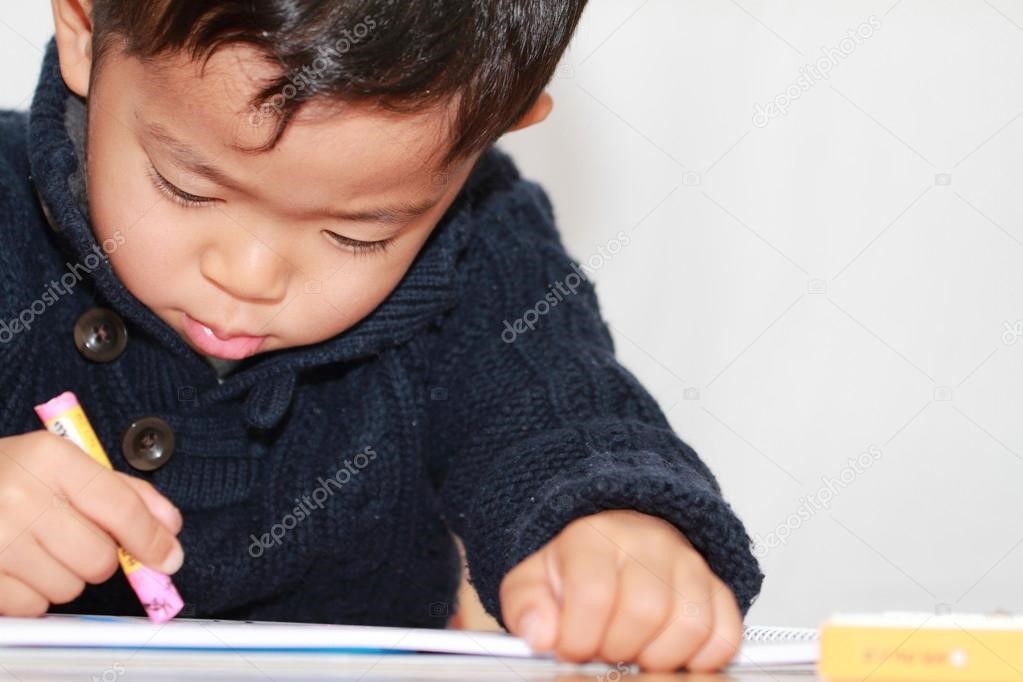 |
Social/Emotional
- Enjoys doing new things
- Plays ‘mom’ and ‘dad’
- Would rather play with other children than by himself
- Cooperates with other children
- Talks about what she likes and what she’s interested in
Language/Communications
- Sings a song and says a poem from memory such as ‘wheels on the bus’
- Tells stories
- Can say first and last name
Movement/Physical/Cognitive Development
- Names some colours and numbers
- Understands the idea of counting
- Starts to understand time
- Remembers part of a story
- Draws a person with 2 or 4 body parts
- Uses scissors
- Starts to copy some capital letters
|
- Can’t jump in place
- Has trouble scribbling
- Shows no interest in interactive games or make-believe
- Ignores other children or doesn’t respond to people outside the family
- Resists dressing, sleeping, and using the toilet
- Doesn’t follow 3-part commands
- Doesn’t use “me” and “you” correctly
- Speaks unclearly
- Loses skills he once had
|
At 5 years
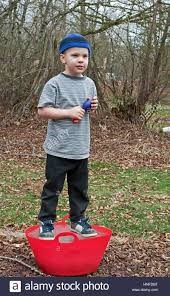 |
Social/Emotional
- Wants to please friends
- Wants to be like friends
- More likely to agree with rules
- Likes to sing, dance, and act
- Is aware of gender
- Can tell what’s real and what’s make-believe
- Shows more independence (for example, may visit a next-door neighbour by himself [adult supervision is still needed])
- Is sometimes demanding and sometimes very cooperative
Language/Communications
- Speaks very clearly
- Tells a simple story using full sentences
- Uses future tense; for example, “Grandma will be here.”
- Says name and address
Movement/Physical/Cognitive Development
- Stands on one foot for 10 seconds or longer
- Hops
- Can do a somersault
- Uses a fork and spoon and sometimes a table knife
- Can use the toilet on her own
- Swings and climbs
- Counts 10 or more things
- Can draw a person with at least 6 body parts
- Copies a triangle and other shapes
- Knows about things used every day like money and food
|
-
- Doesn’t show a wide range of emotions
- Shows extreme behaviour (unusually fearful, aggressive, shy or sad)
- Unusually withdrawn and not active
- Is easily distracted, has trouble focusing on one activity for more than 5 minutes
- Doesn’t respond to people, or responds only superficially
- Doesn’t play a variety of games and activities
- Can’t give first and last name
- Doesn’t use plurals or past tense properly
- Doesn’t talk about daily activities or experiences
- Doesn’t draw pictures
- Can’t brush teeth, wash and dry
hands, or get undressed without help
|
